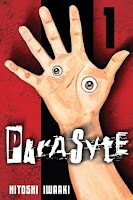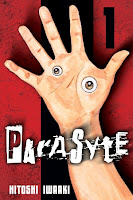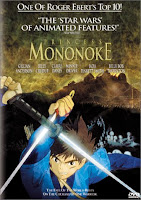 Creator: Hitoshi Iwaaki
Creator: Hitoshi Iwaaki
U.S. publisher: Del Rey
ISBN: 9780345496249
Released: May 2007
Original release: 1990
Awards: Kodansha Manga Award, Seiun Award
I first learned about Hitoshi Iwaaki’s manga series Parasyte at a library conference last year. Kate Dacey of The Manga Critic mentioned it during the “Best Manga You’re Not Reading” panel which focused on great manga that relatively few libraries seemed to have on their shelves. Parasyte was originally published in Japan between 1990 and 1995, winning the Kodansha Manga Award in 1993. The series was initially published in English by Tokyopop in twelve volumes. In fact, Parasyte was one of the first series that they ever published. Beginning in 2007, Parastye was released in English by Del Rey Manga, following the original eight volumes of the Japanese edition. I’ve never read Tokyopop’s version of Parasyte, but I have read the entire series as published by Del Rey. They have done a fantastic job with the printing and adaptation of the series. I completely agree that Parasyte belongs on the list of best manga you’re not reading. That is, if you haven’t already read it.
They fell from the sky. Small, intelligent, parasitic creatures that after entering the host’s body, completely take over its brain and begin eating potential hosts of the same species. The parasites favored group? Humans. And most of them don’t even know the parasites exist. But high school student Shinichi Izumi does. He’s been infected by a parasite that failed to take over his brain and now resides in his right arm. Neither of them are particularly happy with this situation, but it’s currently beneficial for them to cooperate with each other. Without Shinichi, Migi, the parasite, would die. Understandably, it’s very protective of Shinichi’s body. It soon becomes clear that Shinichi’s survival depends on Migi, as well. And even if it didn’t, without the parasite he would be down an arm. So, for the time being at least, they’ll work together, hoping to keep their existence a secret from both the parasites and the humans.
The relationship between Shinichi and Migi is extremely important in Parasyte. Shinichi does seem to move rather quickly from absolute terror to a lazy acceptance of the situation, but he doesn’t really have much of a choice. He gets more and more used to having Migi around, but every once in a while the parasite will do or say something to bring Shinichi crashing back to reality. I like Shinichi a lot. He has a good-natured, easygoing personality. Migi, too, is fairly likeable even considering what it is. However, the longer they stay together the more they change and adapt. And the changes don’t go unnoticed—both Shinichi’s (unofficial) girlfriend Murano and his mother sense something is different. As a reader, it’s fascinating to watch Shinichi and Migi’s relationship develop. Initially, Migi is only concerned about its own, and by extension Shinichi’s, survival. In turn, this slowly makes Shinichi more ruthless and selfish in his own thinking.
I really like Parasyte. The first volume easily pulls the reader in. Not only is the series entertaining and engaging, it also considers pretty serious questions about the nature of humanity. Parasyte has some fantastic moments of humor, mostly caused by Migi not quite understanding the subtleties of human interaction yet, which keeps the series from getting too heavy. Granted, this does make the darker aspects of the story stand out even more in contrast. Another source of amusement is Shinichi’s parents. They’re wonderfully down-to-earth people, especially his father, and they have a great relationship with their son. Iwaaki also incorporates some excellent visual gags, including one of my favorite unexpected moments out of all the manga I’ve read so far. (I won’t say more, because I don’t want to spoil it.) I’ll just end by saying you should give Parasyte a try if you haven’t already; it’s a great series.




